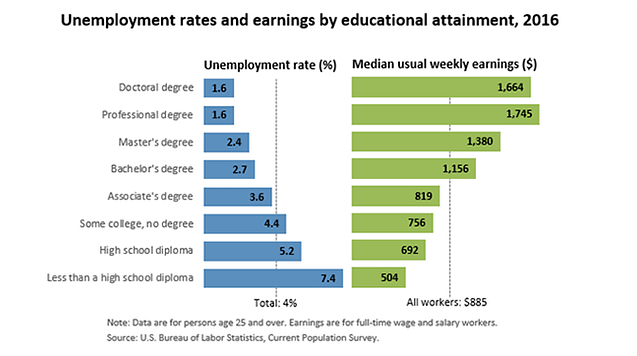[dropcap]A[/dropcap]ccording to The Daily Signal, JoAnn, a mother and a wife worked at Hardee’s for 21 years. She was hired in 1984 and made a starting hourly wage of $4.25. Years later in 2005 she had worked her way to a mere $8 an hour, with an increased wage of only $3.75. With no higher education or training for a new job, she remained at Hardee’s and struggled to pay her recently increased rent payments, buy groceries, and not to mention raise her children. She left Hardee’s without a penny in savings. Although it is important to have these low income and entry level jobs available for young adults to gain work experience, these are the not the kind of jobs for adults who need to support themselves and their families. These types of jobs give valuable experience which employers look for, but this is only one element. Higher education is another. Even though college is not a guarantee that you will find your dream job, today a degree is becoming a necessity to more and more employers.
Financial Payoff
Whether or not to pursue a higher education is the most expensive decisions high school graduates can make in their young lives. According to a survey conducted by CollegeData, a typical 4 year Bachelor’s degree can average higher or lower than $40,000. With all the necessary expenses including books, meal plans, places to live, and tuition, the answer to whether a single mother’s children will be able to attend college is questionable, or any high school graduate in that matter. But what is the financial payoff of going to college? And is it really worth the loans and colossal debt?

Image by BLS
According to an employment projection conducted by The Bureau Of Labor Statistics, the unemployment rate of those with only a high school degree is 5.2%, but only with an average weekly earning of $692. This is very sparse compared to those with a Bachelor’s degree, with an unemployment rate of 2.7% and an average weekly earning of $1,156. It is shown by ProCon, that family households who are headed by individuals with a bachelor’s degree average $100,092 yearly, doubling the income of a family headed by high school graduates.
Overall, individuals who receive a higher education have a higher median salary and have a smaller unemployment risk.
Opportunity
Although there have been many successful people in our time who never pursued higher education, but as much as we wish, we cannot all be like Steve Jobs or Bill Gates. Many studies conducted today, such as one conducted by CBS, show that two thirds of high school graduates ages 25 to 64 were employed in 2015, down from 73% in 2007. In the same age group only with college graduates, employment only decreased from 84 to 83%.
[perfectpullquote align=”full” bordertop=”false” cite=”” link=”” color=”” class=”” size=””]“College graduates are essential in a nationwide labor market,”[/perfectpullquote]
Enrico Moretti, an economist at the University of California, Berkley states. According to a report from Georgetown University, Of the 11.6 million jobs which were created following the Great Recession, 8.4 million of the jobs went to those with at least a Bachelor’s degree, and the 3 million went to those with an associate’s degree or some college. Leaving behind .2 million for high school graduates without higher education.
Higher education also allows you to explore job fields and offers internships, job shadowing, and a wide variety of courses to direct you towards your career. According to ProCon, 80 percent of college graduates complete internships to gain work experience before entering the job market. Even if you do not wish to attend college for 4 or more years, there are many programs of higher education you can choose from.
Trade school, also called vocational school, is a promising option for those who do not want to commit 4 years of time and money to receive training for a job. According to North American Trade Schools, an average trade school cost 70 percent than an average college, and a trade school tuition is typically paid off in 5 years. Trade school majors range from construction and plumbing, to jobs such as accounting and cosmetology.
Image by Pixabay
Community college is another great and cheaper option for a 2 year degree rather than a 4 year university. Overall, education after high school gives you an opportunity to explore your interests with many schools and programs to choose from.
The Drawbacks
Although there are many pros of pursuing a higher education, there are also some drawbacks. Of these drawbacks, the most concerning is the steep price. With all of the college loans combined in the U.S., a jaw dropping $1.45 trillion is distributed out among 44 million borrowers, according Student Loan Hero. That’s $620 million more than the total U.S. credit debt! These amounts are not expected to decrease, because according to CNBC, college tuition is annually increasing by 6%, and in the future, yearly state college tuition could average $54,000.
These loans will not only affect the student, who will be carrying these debts with them for much of their lives, but also their family, and their incomes may not keep up.
According to CNBC, in order to cover 50% of tuition, it is estimated that $320 should be put away and invested a month for 18 years. For a private college, $1,000 is advised to do so as well. This is a serious burden, especially when many parents are still paying off their own college loans and also putting money away for their retirement. The cost of higher education can also cause students to drop out altogether, or ultimately never pursue it due to the high price.
Another common issue among college students is their uncertainty of their major. Switching majors, or not choosing the right one is a very expensive mistake, and according to The University of LaVerne, 50-70% of students change their major at least once. College students whose major does not reflect their interests are more likely to drop out. Many students today are focused on the salary of their future job, instead of their skills and interests.
According to an article by Liz Weston of NBC, “Parents and students are increasingly focused on pursuing majors that will provide a great salary,” Lynn O’Shaughnessy, a college consultant states.
[perfectpullquote align=”full” bordertop=”false” cite=”” link=”” color=”” class=”” size=””] “Their greatest fear is they will invest all this money and the kid will wind up working at Starbucks.” [/perfectpullquote]
If only this desire for a high salary were replaced with the faith in the their own abilities and interests… Overall, decisions involved with higher education are expensive and life changing, and they should be made wisely.
The Verdict
Many high school students are choosing to not receive higher education. Even my brother chose not to take the ACT exam and didn’t even think about receiving any higher education after high school,
[perfectpullquote align=”full” bordertop=”false” cite=”” link=”” color=”” class=”” size=””]But now in his senior year, he dreams of attending a University, because “it’s the right choice”.[/perfectpullquote]
College is a big commitment, expensive, but pays off and is worth it in the long run. There are many options out there, so why not give one a try?
Featured image by Pixabay






What do you think?
Show comments / Leave a comment